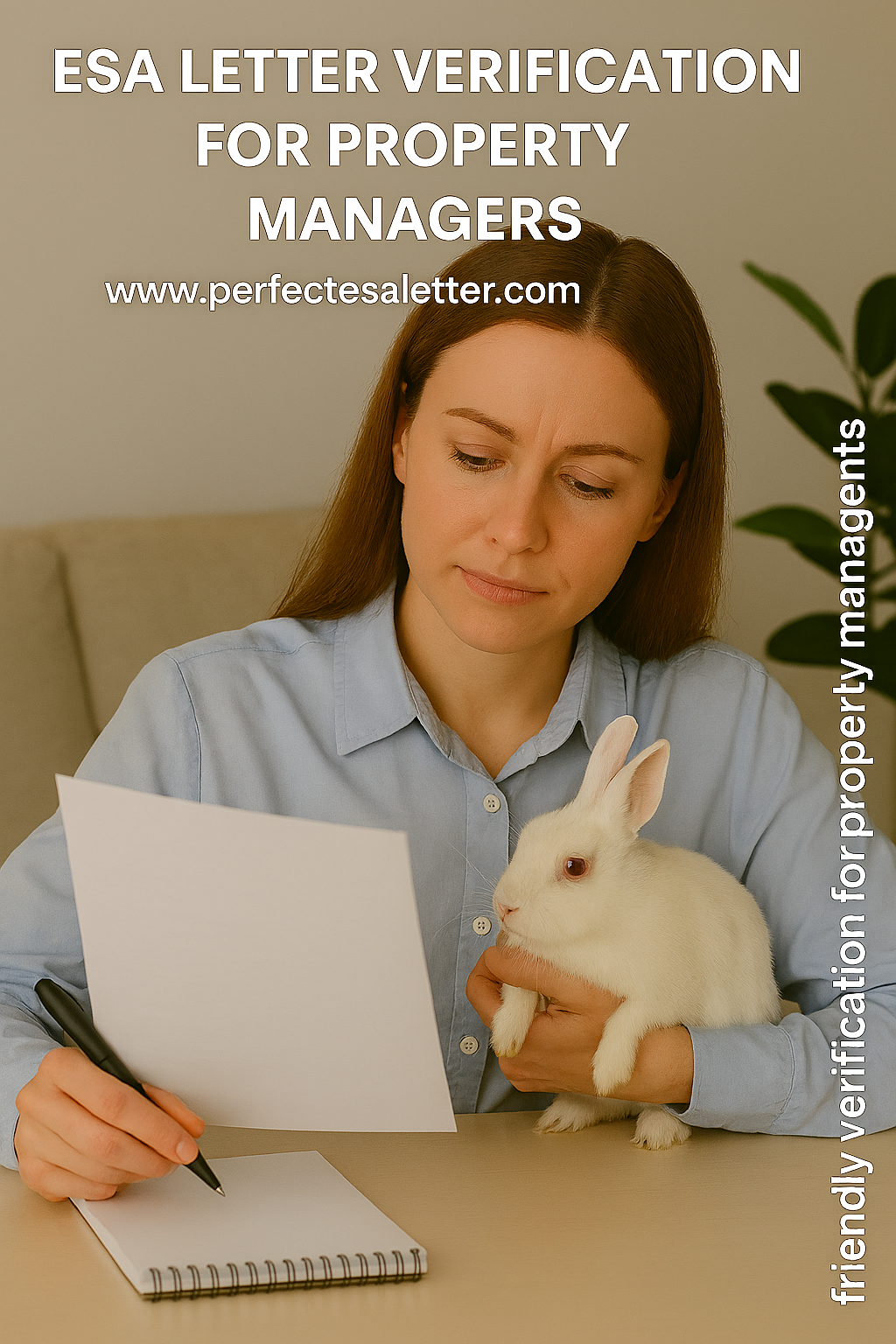ESA Letter Verification for Property Managers: A Complete Guide
ESA Letter Verification for Property Managers: A Complete Guide
Introduction
Property managers play a critical role in ensuring that housing laws are followed while balancing tenant needs. When a tenant requests an emotional support animal (ESA) accommodation, landlords and property managers often wonder how to verify ESA letters properly without violating federal law.
This guide explains the legal process of ESA letter verification, what managers can (and cannot) ask for, and best practices for handling accommodation requests under the Fair Housing Act (FHA) and HUD guidance.
”Get Yours Now!
Don’t wait until a landlord or airline tells you “no pets allowed.” Protect your rights today.
Please fill out this form and our team wil contact you ASAP.
Complete your assessment in minutes , get approved by a licensed professional, and receive your letter within 24 hours.
Understanding ESA Letters
An ESA letter is a formal document written by a licensed mental health professional (LMHP) stating that a tenant requires an emotional support animal due to a mental or emotional disability.
It must:
- Be on official letterhead.
- Include the professional’s name, license type, and contact information.
- Confirm that the tenant has a disability and that the ESA helps alleviate symptoms.
- Be signed and dated by the LMHP.
👉 Note: The letter does not need to disclose the tenant’s exact diagnosis.
HUD Guidance on ESA Verification
According to the U.S. Department of Housing and Urban Development (HUD):
- Valid ESA Requests
- Property managers must treat ESA letters as reasonable accommodation requests under the FHA.
- ESA letters must come from a licensed professional with a therapeutic relationship to the tenant.
- Verification Process
- Landlords can request a copy of the ESA letter.
- They may verify the LMHP’s license status (through state boards or databases).
- They cannot demand medical records or diagnosis details.
- Timeframe for Response
- Managers must respond to ESA requests in a timely manner to avoid discrimination claims.
What Property Managers Can Ask
When verifying an ESA letter, property managers can request:
- Confirmation that the document is from a licensed mental health professional.
- Contact details of the LMHP (to verify credentials, not to probe medical details).
- Assurance that the letter is current and legitimate (typically issued within the past 12 months).
What Property Managers Cannot Ask
Managers cannot:
- Request specific medical records or diagnoses.
- Ask intrusive questions about the tenant’s disability.
- Require the tenant to use a specific verification service.
- Charge pet fees, deposits, or rent for ESAs.
- Enforce breed or weight restrictions.
👉 Doing so may be considered a violation of the FHA and result in legal liability.
Steps for Property Managers to Verify ESA Letters
Step 1: Review the ESA Letter
Check that it includes:
- LMHP’s full name, license number, and professional title.
- Confirmation of the tenant’s disability-related need for an ESA.
- Date and signature.
Step 2: Verify the License
- Search the LMHP’s license number in the relevant state licensing database.
- Ensure the license is active and valid.
Step 3: Confirm Timeliness
- ESA letters should generally be issued within the last year.
- Outdated letters may require renewal.
Step 4: Respect Privacy
- Do not call the LMHP to ask for medical records.
- Communication should remain professional and non-intrusive.
Best Practices for Property Managers
- Establish a Standard Policy
Create a clear, written policy for processing ESA requests to ensure fairness. - Train Leasing Staff
Educate staff about ESA rights so they don’t mistakenly deny valid requests. - Stay Neutral
Even if a property has a strict “no pets” rule, ESAs are not considered pets. - Keep Documentation
Maintain secure files of ESA requests while respecting tenant privacy. - Avoid Delays
Failure to respond promptly may expose the property manager to discrimination complaints.
Handling Suspected Fake ESA Letters
Unfortunately, many online services sell “instant ESA letters” without proper evaluations. As a property manager:
- Verify the LMHP’s credentials (check licensing databases).
- Look for red flags, such as letters without contact info, generic templates, or suspicious online services.
- If the letter seems illegitimate, you may request clarification or deny the accommodation based on fraud.
👉 Always consult legal counsel before denying an ESA request to avoid compliance risks.
Case Example: Property Manager Compliance
Example Scenario
A tenant applies for a luxury apartment in Seattle with a “no-pet” rule. They provide an ESA letter from a licensed psychologist.
The property manager:
- Reviews the letter for completeness.
- Confirms the psychologist’s license through the state licensing board.
- Approves the request without fees.
By following HUD guidelines, the manager avoids discrimination claims and maintains professional tenant relations.
Consequences of Improper Verification
If property managers improperly deny ESA letters, they risk:
- Fair Housing complaints filed with HUD.
- Fines and penalties for housing discrimination.
- Legal action from tenants.
- Reputational damage to their property management company.
Conclusion
ESA letter verification doesn’t need to be complicated. Property managers simply need to:
- Confirm the legitimacy of the ESA letter.
- Respect privacy laws.
- Avoid unnecessary or intrusive requests.
- Respond promptly and fairly.
By following HUD and FHA guidelines, property managers can ensure compliance, protect tenant rights, and maintain a smooth rental process.
ESA verification isn’t about gatekeeping—it’s about balancing legal obligations with ethical housing practices.
”Get Yours Now!
Don’t wait until a landlord or airline tells you “no pets allowed.” Protect your rights today.
Please fill out this form and our team wil contact you ASAP.
Complete your assessment in minutes , get approved by a licensed professional, and receive your letter within 24 hours.

